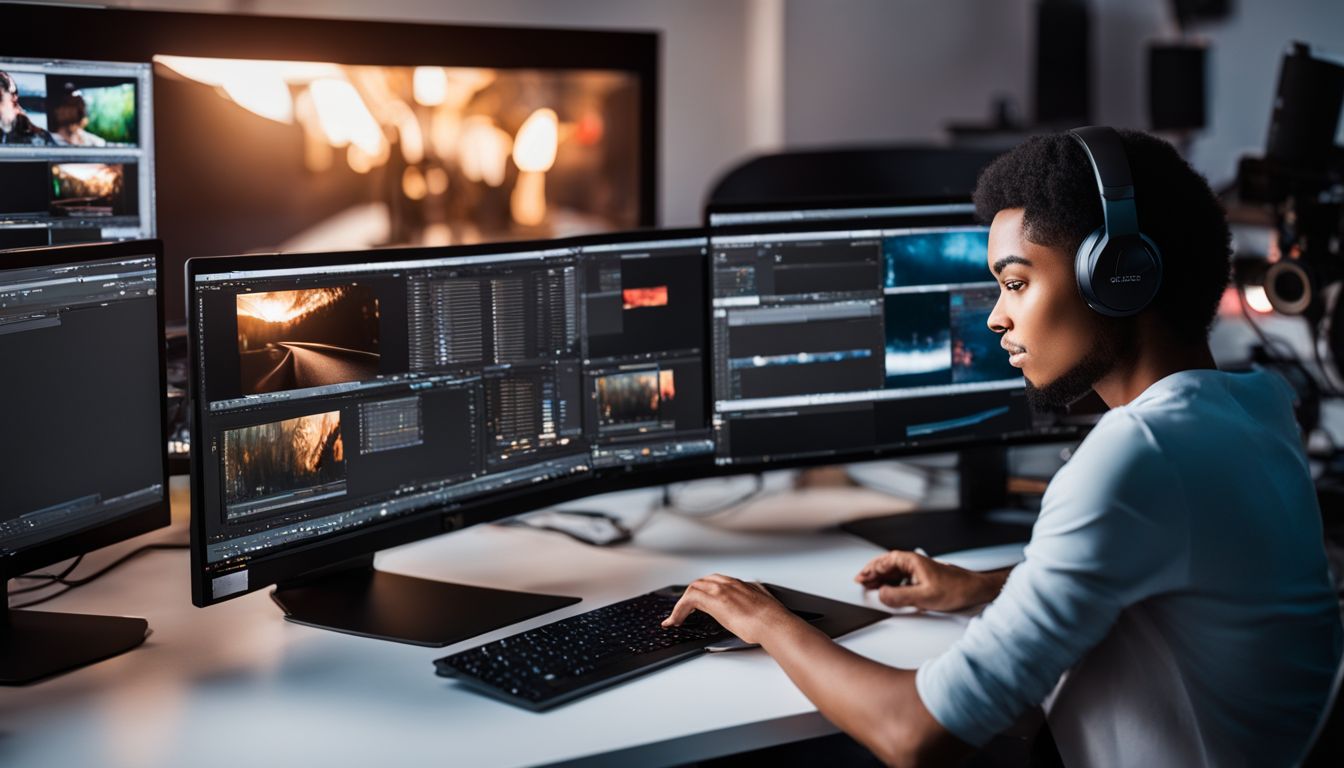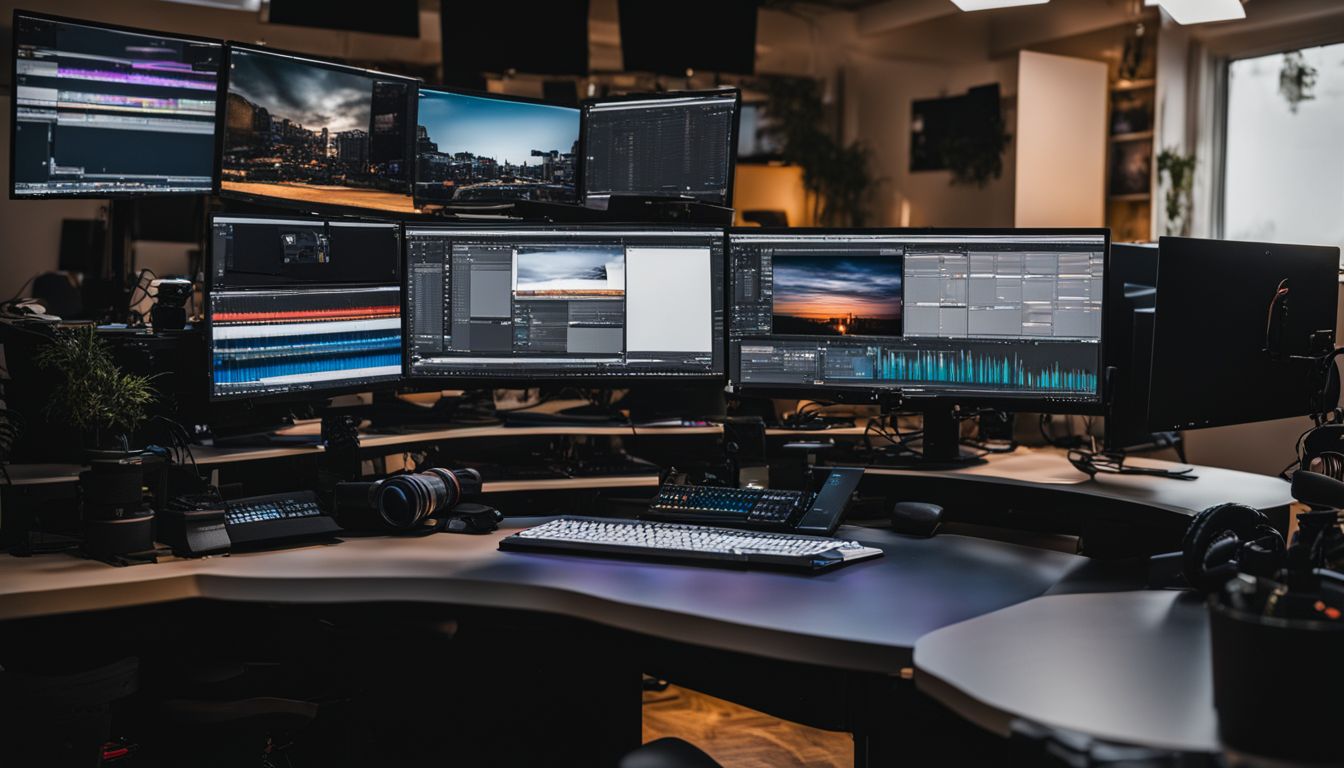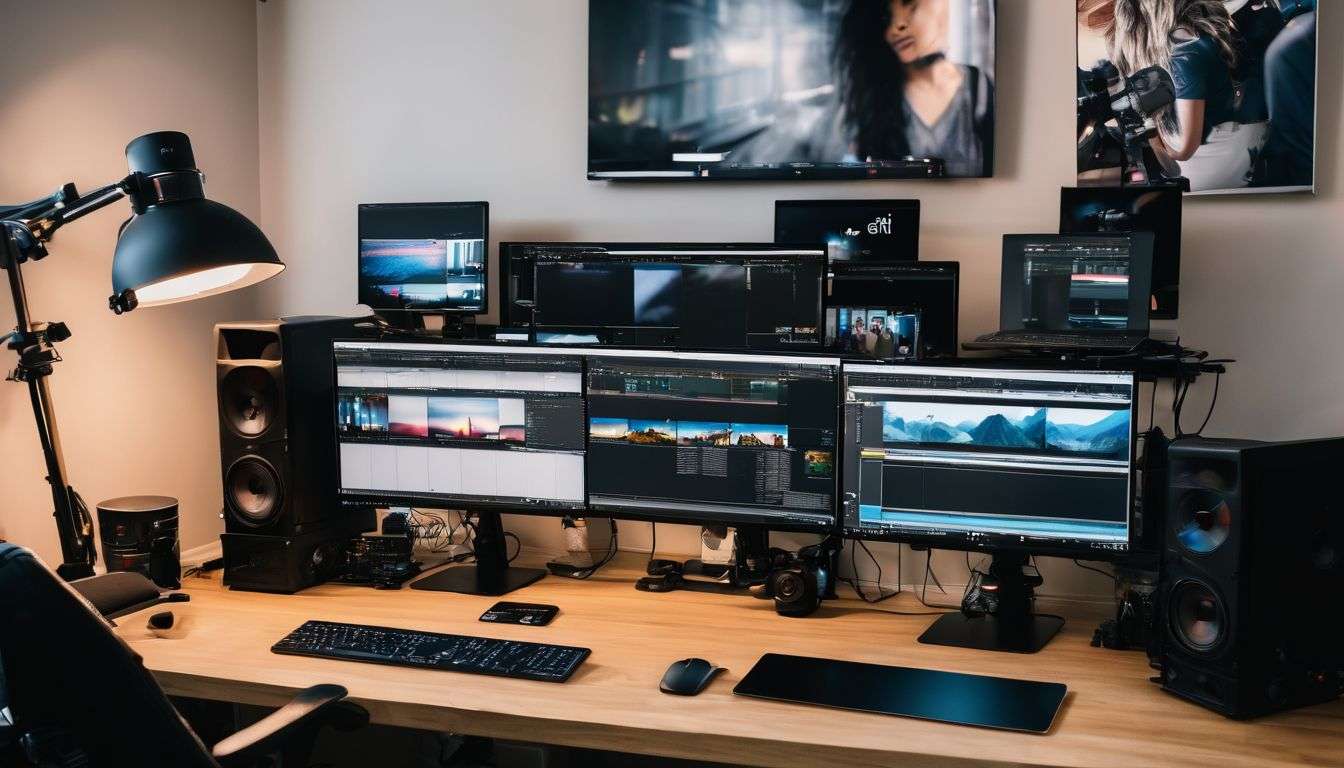Ever pondered over who’s responsible for those mesmerising movie scenes or captivating YouTube videos? You’re not the only one! Much like you, we were piqued about the magicians who artfully blend unique shots and construct a smooth visual narrative.
They are known as video editors – creative professionals who are truly ‘cut from different cloths’. In this blog post, our aim is to unravel their fascinating world; talking through what they do, the skills needed in their craft, potential education and training routes for budding video editors along with information on their employment prospects and earnings.
Fancy changing your views on video editing? Let’s jump right in!
Key Takeaways
- People who edit videos are called video editors.
- Video editing involves arranging shots, adding effects, correcting colors, and incorporating sound to create visually appealing and engaging videos.
- There are three main types of video editing: film editing, commercial editing, and documentary editing.
What are the Three Types of Video Editing?

Video editing has three main types.
- Film Editing: This is used in movies and TV shows. It involves arranging shots to make a story. A film editor does this job.
- Commercial Editing: This is used in ads or short clips. It aims to sell a product or an idea. A commercial editor takes care of this.
- Documentary Editing: This type tells real stories about people or events. The documentary editor puts it all together.
Roles and Responsibilities of Video Editors

Video editors are responsible for editing raw footage, adding transitions and effects, incorporating sound and music, ensuring continuity and pacing, and collaborating with other team members during the postproduction process.
Editing raw footage
We take raw footage and make it clean. First, we look at all the video clips. We pick out the best parts. These parts are put in order to tell a story. This part of our job is very important.
It starts the whole editing process.
Next, we cut or trim these pieces and put them together like puzzle pieces. Each piece should match with the next one. They should flow smoothly without any jolts or jumps for the viewer’s eye.
This gives life to what was just raw footage before, making it more engaging and appealing for viewers.
Adding transitions and effects
Adding transitions and effects is a key job for a video editor. We use our skills to move smoothly from one scene to the next. This helps the story flow well. We also add special effects to make the video more exciting.
Sometimes, we can use these effects to show something that was not really there when we shot the video. Video editors know how to use software tools correctly for this work. It takes time to learn, but it helps us create great videos in the end!
Incorporating sound and music
Video editors often deal with sound and music too. They select the right tunes to set the mood for scenes in a video. Loud beats can make action parts feel more exciting. Soft music can make sad moments even more touching.
Sound effects are also added to make videos look real and alive. For example, bird sounds can be added to forest scenes or car noises in city shots. All these help tell a story that catches the viewer’s interest.
Ensuring continuity and pacing
Good pacing gives a video life. We make sure each shot flows into the next. This keeps the story moving and viewers engaged. Continuity is also key in our work. It means making all the parts match up.
For example, we use cut-in or cut-away shots to smooth over sudden shifts. This way, viewers don’t notice when things change too fast between shots.
Collaborating with other team members
Working with other team members is key in our job as video editors. We join up with people like film directors, cinematographers and sound editors. Together we bring the video to life.
All of us have a part in making the final product great.
We talk and share ideas to make sure we do our tasks well. Good videos need good teamwork! Strong communication helps keep everything moving smoothly. This way, we all know what needs doing at every step of the video editing process.
Skills Required for Video Editing Jobs
To excel in video editing jobs, individuals need to possess a strong proficiency in video editing software, along with the ability to think creatively and pay attention to detail. Effective communication and problem-solving skills are also crucial, as is the ability to work well under tight deadlines.
Proficiency in video editing software
You must be good at using video editing software to become a video editor. Adobe Premiere Pro, Final Cut Pro and Avid Media Composer are apps you should know. They let you cut and arrange clips, add effects, adjust the colours and sound levels.
Knowing these tools will help you create great videos that tell a story in an appealing way. Learning to use this software is key for anyone who wants to edit videos for work or fun.
It’s like having the right brushes for a painter!
Creativity and attention to detail
Video editing requires both creativity and attention to detail. As a video editor, it’s important to have the ability to think outside the box and come up with innovative ideas for how to arrange and manipulate footage.
This includes choosing the right shots, adding transitions and effects that enhance the storytelling, and incorporating sound and music that complements the visuals. At the same time, video editors must pay close attention to details like continuity, pacing, color grading, audio levels, and overall visual appeal.
Every frame counts in creating a polished final product that captivates viewers. It’s this combination of creativity and meticulousness that makes video editing such an important skill in bringing stories to life on screen.
Strong communication and problem-solving skills
In addition to technical skills, video editors also need strong communication and problem-solving skills. They must be able to effectively communicate with clients, directors, and other team members to understand their vision and meet their expectations for the final product.
Clear communication helps ensure that everyone is on the same page and can contribute valuable ideas throughout the editing process.
Video editors also need problem-solving skills to overcome any challenges that may arise during the editing process. This includes finding creative solutions for issues such as footage errors, mismatched audio, or time constraints.
Being able to think critically and troubleshoot problems efficiently allows video editors to deliver high-quality work while meeting deadlines.
Ability to work under tight deadlines
Meeting tight deadlines is an essential skill for video editors. In this fast-paced industry, projects often have strict delivery timelines. Video editors must be able to work efficiently and manage their time effectively to complete editing tasks within the given deadline.
This requires good organizational skills, prioritization, and the ability to handle pressure while maintaining attention to detail. Working under tight deadlines also involves effective communication with team members, including producers and directors, to ensure a smooth workflow and timely completion of the project.
Being able to work under pressure and deliver high-quality results on time is crucial in the field of video editing.
Education and Training for Video Editing Careers
To pursue a career in video editing, individuals can acquire a degree in film or media studies, obtain certifications in video editing software, and gain hands-on experience through internships and practical training.
Degree in film or media studies
Obtaining a degree in film or media studies can be beneficial for individuals pursuing a career in video editing. These programs provide a comprehensive understanding of the filmmaking process, including technical skills, storytelling techniques, and industry knowledge.
By studying film or media studies, aspiring video editors can learn about cinematography, screenwriting, postproduction processes, and visual aesthetics. Additionally, degree programs often offer hands-on experience through internships or practical projects to develop proficiency in video editing software and gain real-world industry exposure.
With a degree in film or media studies, individuals can enhance their skillset and increase their chances of securing job opportunities in the competitive field of video editing.
Certifications in video editing software
Obtaining certifications in video editing software can be beneficial for those looking to pursue a career in this field. These certifications serve as proof of your proficiency and expertise in using specific editing software such as Adobe Premiere Pro, Final Cut Pro, or Avid Media Composer.
Having these certifications not only enhances your resume but also demonstrates that you have the necessary skills and knowledge required to perform video editing tasks effectively.
Employers may prefer candidates with certifications as it showcases their commitment to professional development and staying updated with the latest industry techniques. Additionally, these certifications can provide you with access to exclusive training resources and networking opportunities within the video editing community, which can further enhance your skills and career prospects.
Internships and hands-on experience
Getting hands-on experience and internships are valuable opportunities for aspiring video editors. These experiences allow individuals to apply their skills in a real-world setting, working alongside professionals in the industry.
During an internship, you may work on editing projects, learn about different editing techniques, and gain insights into the post-production process. It’s also a chance to make connections and build your network within the industry.
Internships can be found at production companies, film studios, advertising agencies, or even through freelance work. Practical experience gained through internships can enhance your resume and increase your chances of securing a full-time video editing job in the future.
Job Outlook and Salary for Video Editors
The job prospects and earnings for video editors are influenced by several factors. Let’s delve into these:
– The video editing field holds a promising outlook due to the growing demand for digital content across various industries such as film, television, advertising, and online content creation.
– With the rise of social media and digital marketing, there is an increasing need for skilled video editors to produce engaging visual content.
– The salary of a video editor varies widely. It depends on factors such as the individual’s level of experience, geographic location, and the industry in which they work.
– Video editors who have a diverse skill set, such as those referred to as “preditors”, are often more in demand and may command higher salaries.
– Continuous learning and upgrading skills, particularly in the use of advanced video editing software, can also enhance job prospects and earning potential.
– However, it’s also crucial to note that the video editing field is highly competitive. Therefore, building a strong portfolio and gaining hands-on experience through internships or freelance work can be advantageous.
– In terms of education, individuals who have a degree or certification in relevant fields such as film production or multimedia generally have better job prospects.
Conclusion
In conclusion, people who edit videos are commonly referred to as video editors. They play a crucial role in manipulating and arranging video footage to create visually appealing and cohesive final products.
Video editing offers a rewarding career path for those with creativity, attention to detail, and a passion for storytelling through visual media.
Do Videographers Need Video Editing Skills?
Videographers need understanding videography skills because video editing is a crucial aspect of the profession. Whether it’s adding transitions, adjusting audio levels, or enhancing the overall aesthetic, video editing plays a vital role in creating captivating visuals. By possessing video editing skills, videographers can elevate their work and deliver a polished final product to clients.
What Are the Different Roles or Titles for Video Editors?
Video editors can have various roles and titles within the industry. Among the three types of video editing are the offline editor, responsible for assembling footage in post-production, the online editor, who fine-tunes the final cut, and the motion graphics editor, skilled at integrating animations. Each role plays a vital part in creating visually engaging and captivating videos.
FAQs
1. What are people who edit videos called?
People who edit videos are commonly referred to as video editors.
2. Do I need any special skills to become a video editor?
Yes, becoming a video editor usually requires skills in using editing software, understanding visual storytelling, and having an eye for detail.
3. What tasks do video editors typically perform?
Video editors are responsible for assembling raw footage, cutting and rearranging scenes, adding transitions and effects, enhancing audio quality, and finalizing the overall look of the edited video.
4. Is there specialized software used by video editors?
Yes, video editors often use specialized software such as Adobe Premiere Pro or Final Cut Pro to carry out their editing tasks.
5. Can I pursue a career as a video editor without formal education or training?
While formal education or training can be beneficial in developing the necessary skills and knowledge for this field, it is possible to gain experience through self-learning or online tutorials. Building a strong portfolio showcasing your work can also help establish yourself as a professional video editor.






